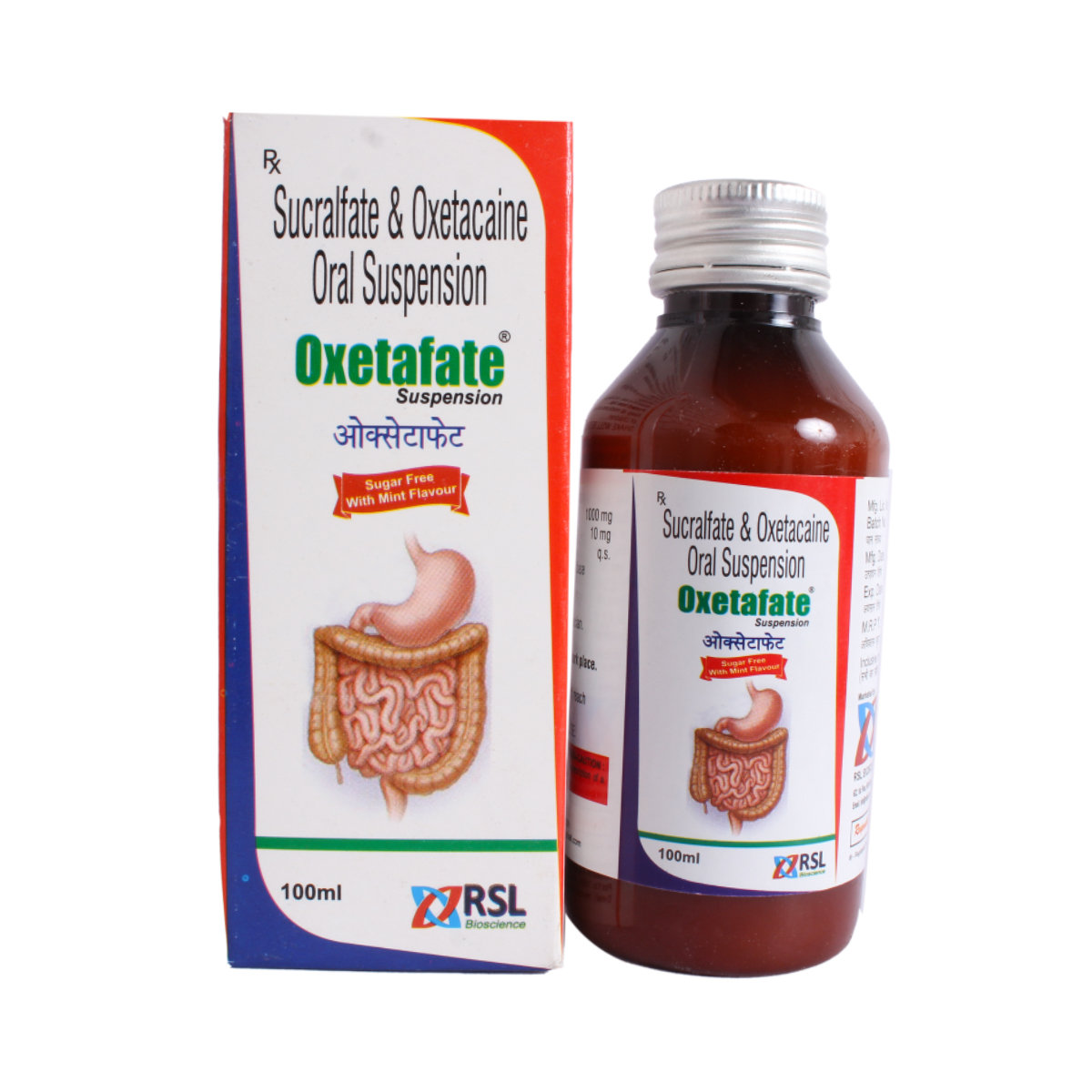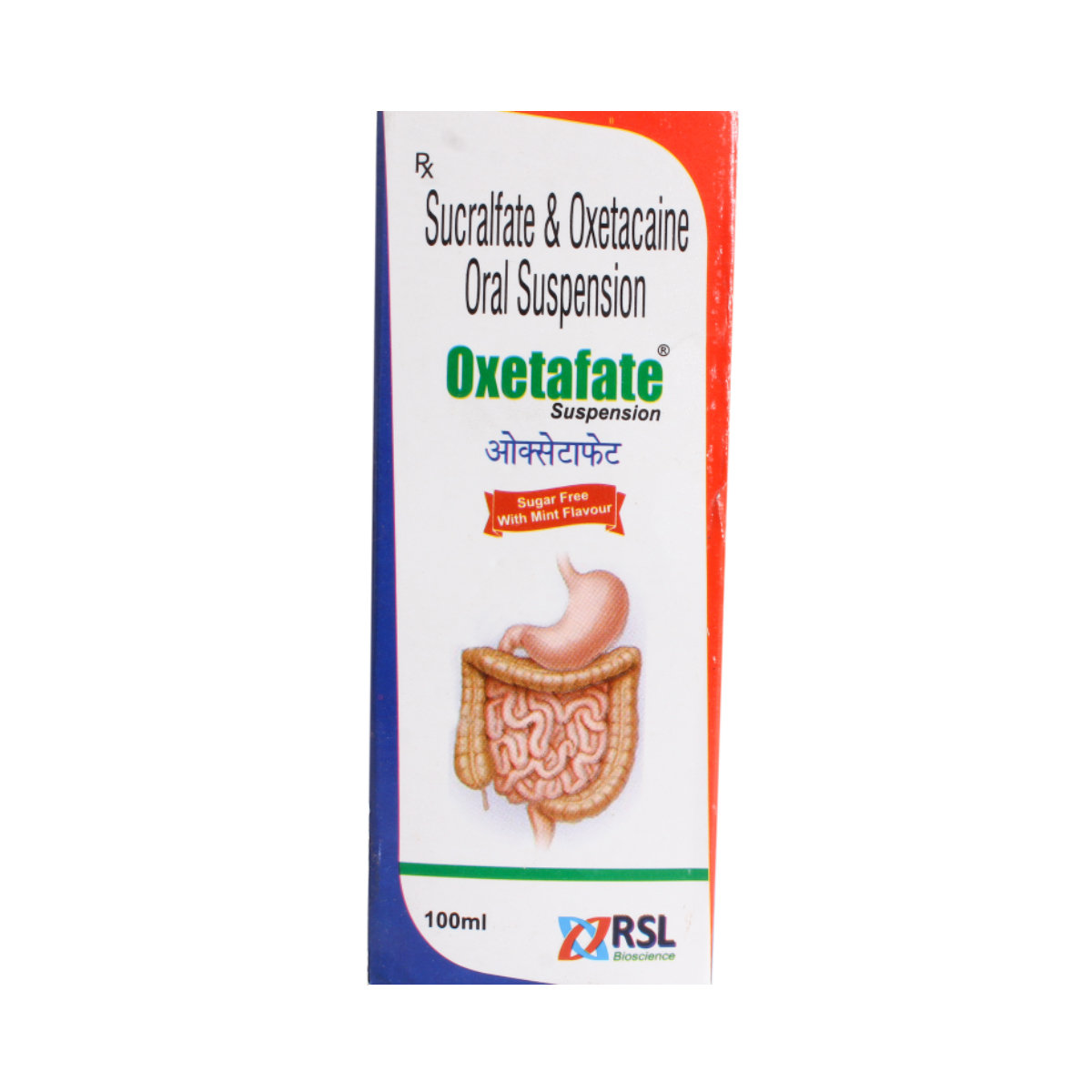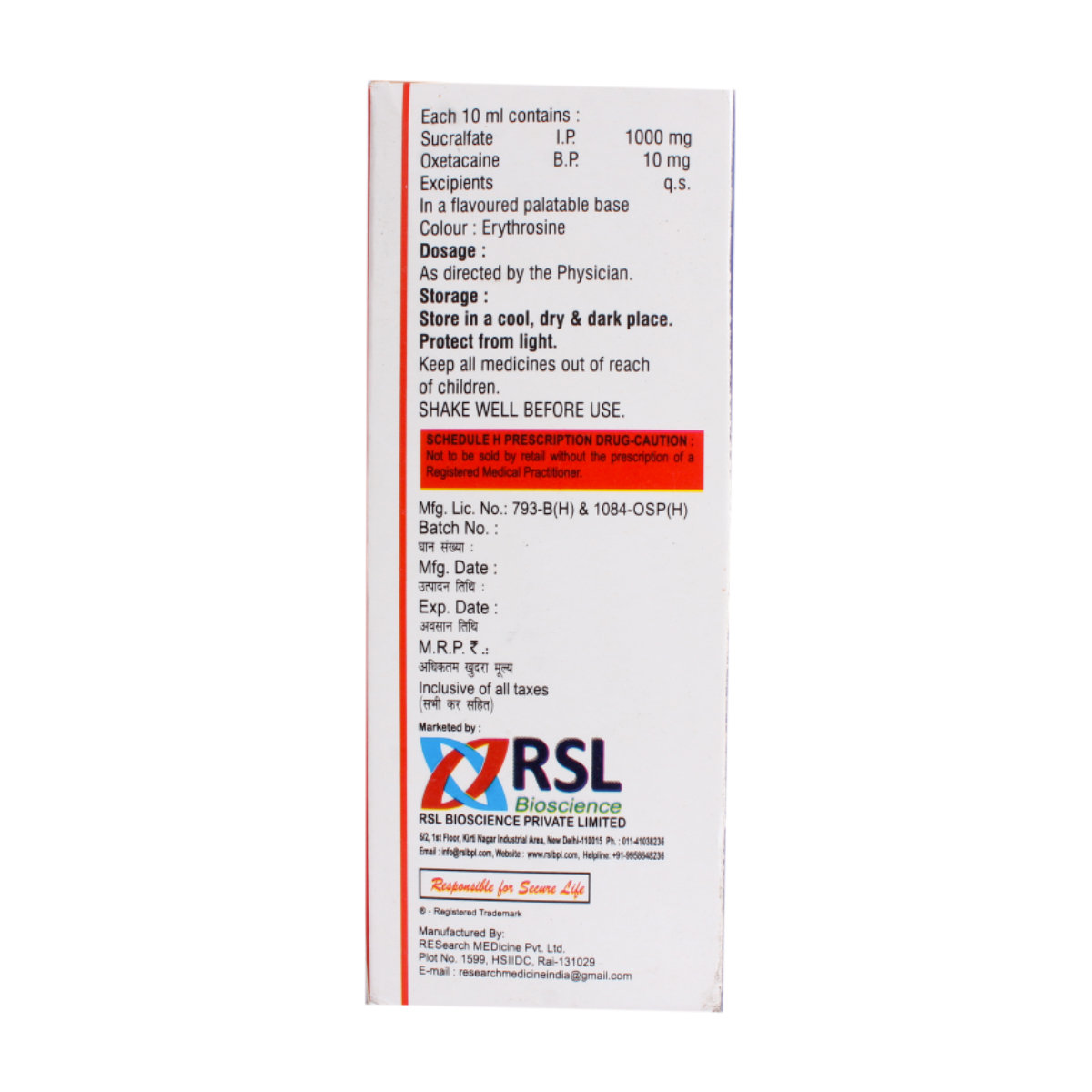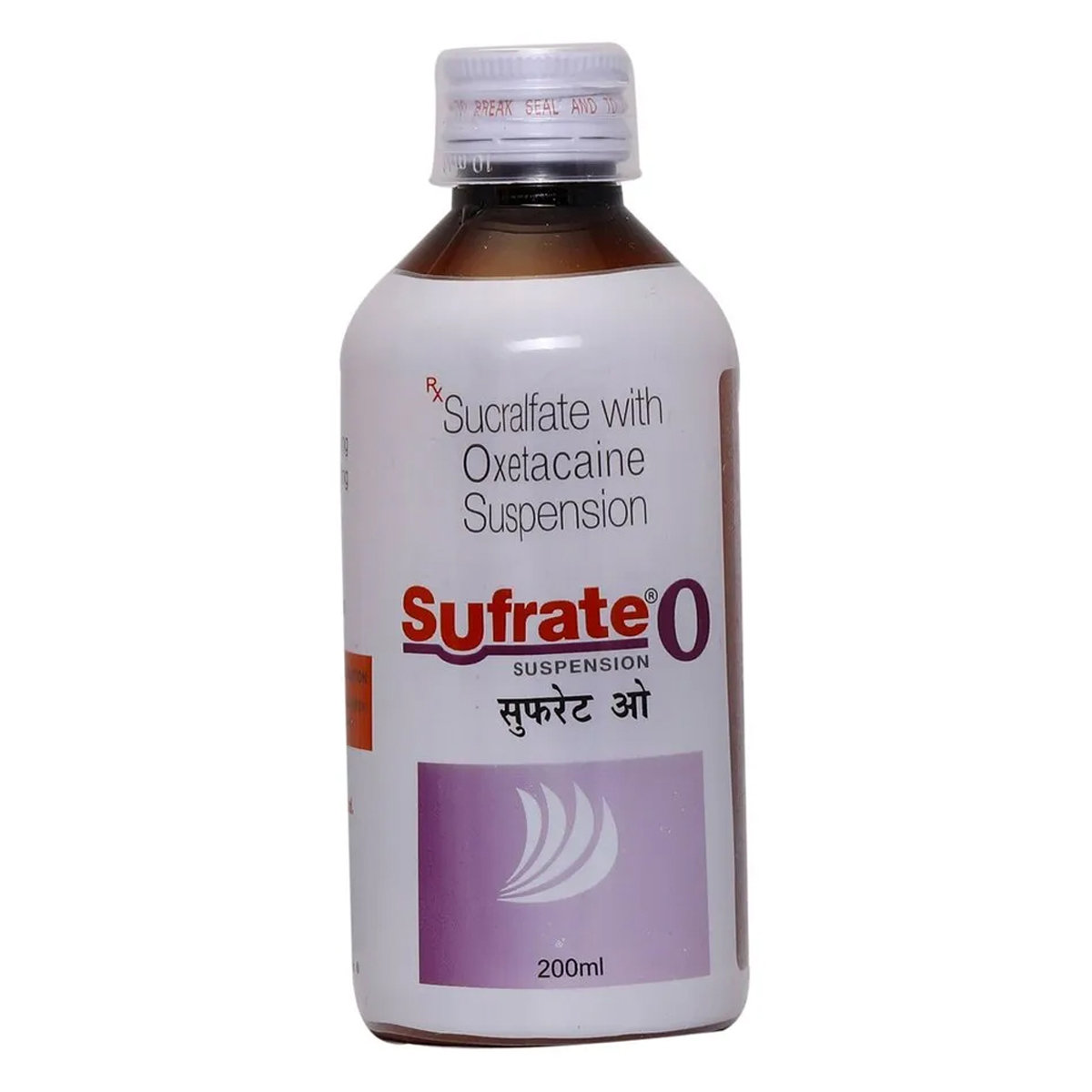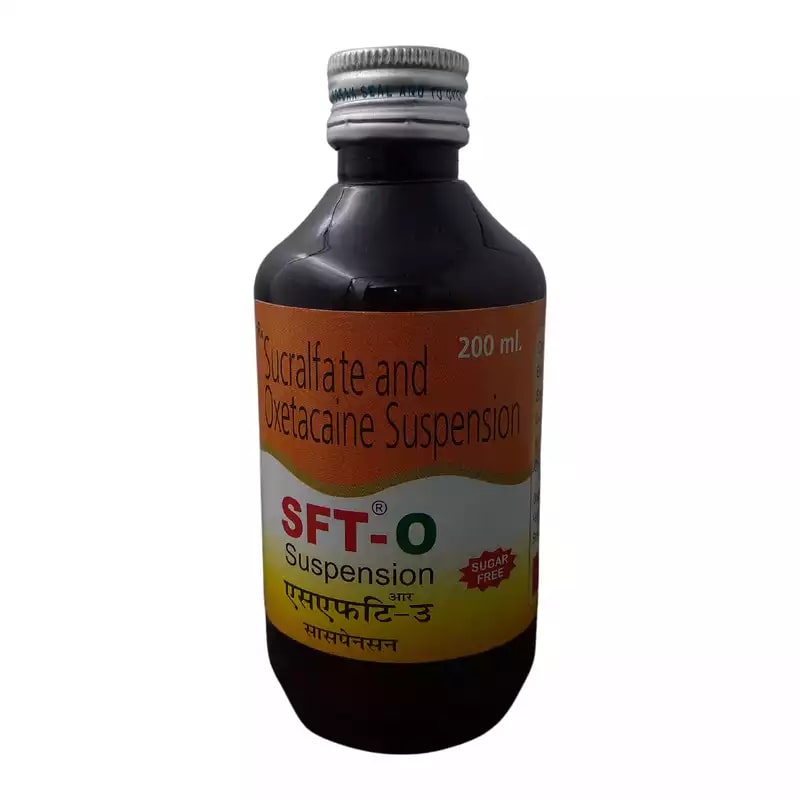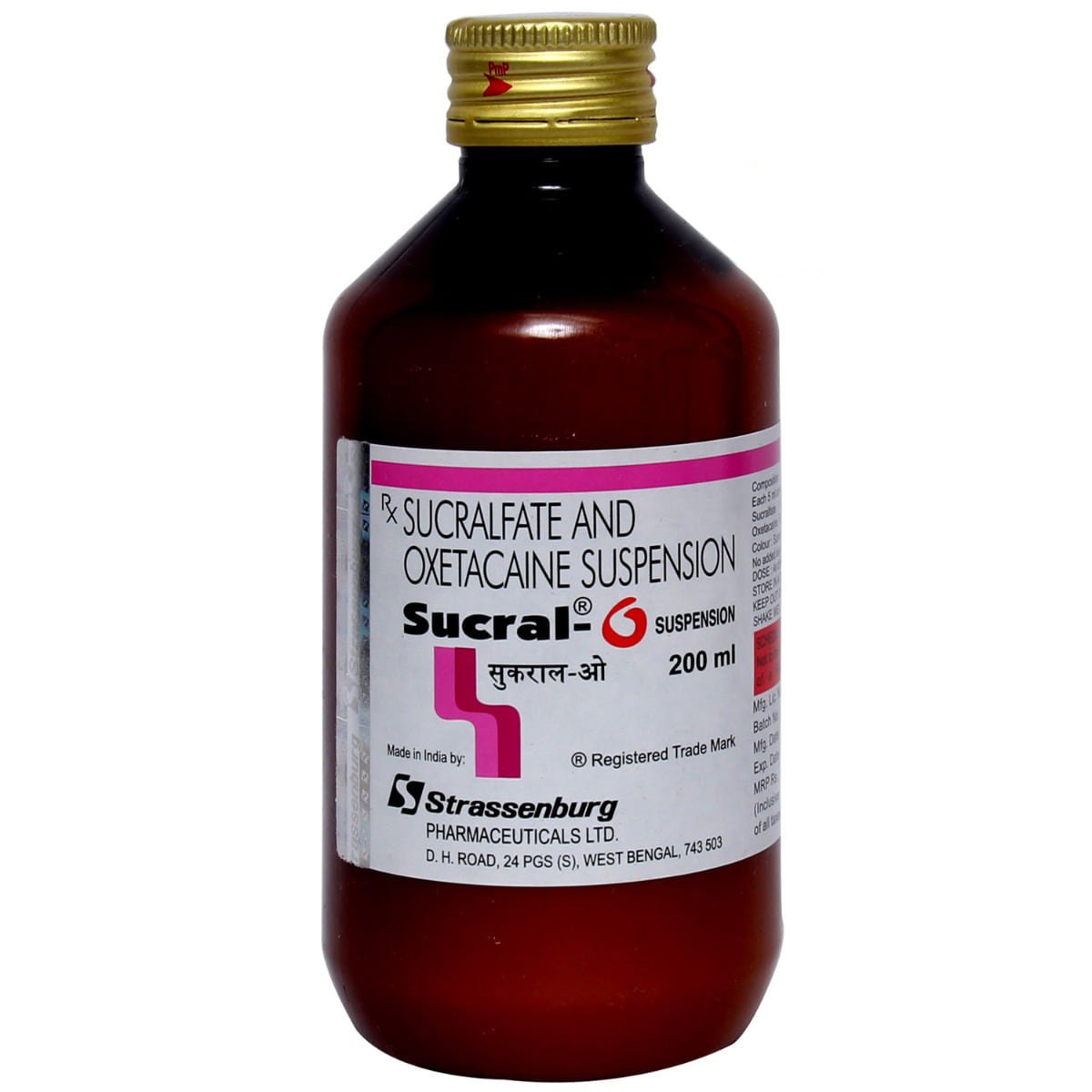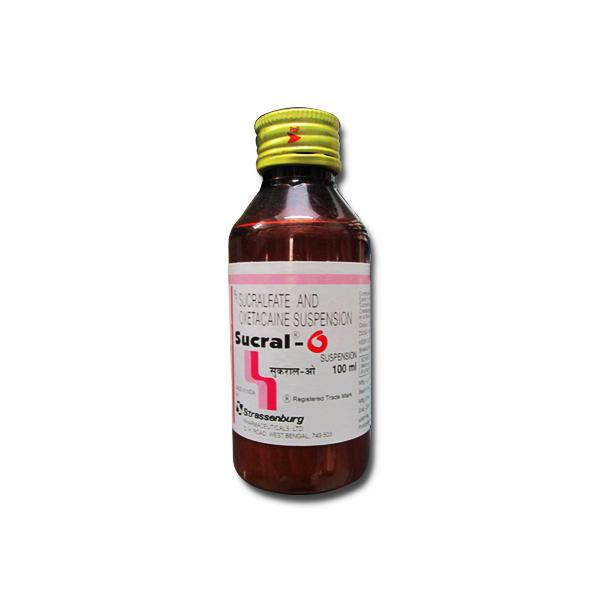Oxetafate Suspension 100ml
MRP ₹150
(Inclusive of all Taxes)
₹22.5 Cashback (15%)
Provide Delivery Location
Online payment accepted
 Prescription drug
Prescription drugWhats That
Composition :
Manufacturer/Marketer :
Consume Type :
Expires on or after :
Return Policy :
About Oxetafate Suspension
Oxetafate Suspension belongs to a group of medicine called 'ulcer protectants' primarily used to treat peptic ulcers or gastrointestinal ulcers. It also treats hyperacidity, heartburn, indigestion, and gastritis (inflammation of the stomach). The stomach is usually protected from acid by a mucous layer. In some cases, due to excess acid production, the mucous layer gets eroded, which leads to complications like acidity and heartburn. A peptic ulcer is a sore on the stomach's lining or the first part of the small intestine (duodenum). Ulcers or sores of the stomach region are called gastric ulcers, while the duodenum ulcer is known as a duodenal ulcer.
Oxetafate Suspension is a combination of two medicines: Sucralfate and Oxetacaine. Sucralfate is a gastrointestinal protectant that works by forming a protective barrier or coat over the ulcer so that digestive enzymes, acid and bile salts cannot further irritate the lining of the stomach duodenum. This protects the ulcer from the acid of the stomach, allowing it to heal. Besides this, Oxetacaine is a local anaesthetic that exerts a numbing effect, thereby providing relief from pain due to ulcers or acidic injury in the stomach.
It is better to take Oxetafate Suspension an hour before a meal or without a meal for its best results. Your doctor will advise you on how often you take Oxetafate Suspension based on your medical condition. Some people may experience common side effects like constipation, dizziness, sleepiness, dry mouth, blurred vision, and diarrhoea. Most of these side effects of Oxetafate Suspension do not require medical attention and gradually resolve over time. However, if the side effects persist or worsen, please consult your doctor.
If you are known to be allergic to Oxetafate Suspension or active and inactive ingredients present on it, please tell your doctor. If you are pregnant or breastfeeding, it is advised to consult a doctor before using Oxetafate Suspension . Oxetafate Suspension should not be given to children as safety has not been established. Try not to stop taking Oxetafate Suspension of your own. Stopping a sudden intake of Oxetafate Suspension will not influence the frequency or severity of future ulceration. Avoid taking aluminium and magnesium-containing antacids with Oxetafate Suspension . Aluminium-containing antacids and Oxetafate Suspension could lead to constipation and intestinal obstruction, whereas magnesium-containing antacids might cause diarrhoea. Avoid consuming alcohol along with Oxetafate Suspension as it could lead to increased acidity.
Uses of Oxetafate Suspension
Directions for Use
Key Benefits
Oxetafate Suspension belongs to a group of anti-ulcerants used to treat acidity, heartburn, gas and stomach ulcers. Oxetafate Suspension is a combination of two medicines: Sucralfate (anti-ulcer) and Oxetacaine (Local anaesthetic). Sucralfate works by forming a protective barrier or coat over the ulcer to pepsin and bile and inhibiting gastric acid diffusion. This protects the ulcer from the acid of the stomach, allowing it to heal. It exhibits a cytoprotective effect and forms a viscous, adhesive barrier on the intact intestinal mucosa and stomach surface. It also stimulates the synthesis and release of gastric mucosal prostaglandins and bicarbonate and the epidermal growth factor that stimulates healing and formation of new healthy skin. On the other hand, Oxetacaine exerts a numbing effect, thereby provides relief from pain due to ulcers or acidic injury in the stomach. It does not lose its activity even in strongly acidic conditions and provides prolonged anaesthetic action.
Storage
- Inform your doctor about your constipation symptoms. They may adjust your medication or advise alternative treatments.
- Stay hydrated by drinking sufficient of water (at least 8-10 glasses a day) to help soften stool and promote bowel movements.
- Increase fibre intake by eating foods high in fibre, such as fruits, whole grains, vegetables and legumes, to help bulk up the stool.
- Establish a bowel routine by trying to go to the bathroom at the same time each day to train your bowels.
- Engaging in regular exercise, like walking or yoga, can support in bowel movement stimulation.
- Consult your doctor if constipation persists, and discuss alternative treatments or adjustments to your medication.
Drug Warnings
You should avoid taking Oxetafate Suspension if you are allergic to Oxetafate Suspension or other ingredients present in it. Inform your doctor before taking Oxetafate Suspension if you have a history of appendicitis, blockage of the bowel, rectal bleeding, kidney problems, low-magnesium diet, or if you have undergone recent bowel surgery. Caution is required before giving Oxetafate Suspension to elderly patients. Sucralfate in Oxetafate Suspension contains aluminium, which is normally removed by your kidney. Therefore, older adults and people who have kidney problems may be at greater risk for developing high aluminium levels while using this drug with other products that contain aluminium (e.g. antacids). Do not take Oxetafate Suspension if you are pregnant or breastfeeding unless prescribed by the doctor. The safety and effectiveness in children are not established, please consult your doctor before giving them Oxetafate Suspension . Avoid consuming alcohol along with Oxetafate Suspension as it could lead to increased acidity.
Drug-Drug Interactions
Drug-Drug Interactions
Login/Sign Up
Co-administration of Oxetafate Suspension 100ml together with Digoxin may decrease the effects of Digoxin.
How to manage the interaction:
If you are supposed to take Digoxin and Oxetafate Suspension 100ml together, your doctor may adjust the dose to safely use both medications. Do not discontinue the medication without consulting a doctor.
Coadministration of Paricalcitol with sulfasalazine may increase the risk or severity of kidney problems.
How to manage the interaction:
There may be a possibility of interaction between Paricalcitol and Oxetafate Suspension 100ml, but it can be taken if prescribed by a doctor. Do not discontinue any medications without consulting a doctor.
Coadministration of dolutegravir with Oxetafate Suspension 100ml can lead to decreased levels and effects of Dolutegravir.
How to manage the interaction:
Although taking Dolutegravir and Oxetafate Suspension 100ml together can possibly result in an interaction, they can be taken together if prescribed by your doctor. It is advised to take dolutegravir either two hours before or six hours after taking a dose of Oxetafate Suspension 100ml. Do not discontinue any medications without consulting a doctor.
Taking Cholecalciferol together with Oxetafate Suspension 100ml may increase the risk or severity of kidney problems.
How to manage the interaction:
There may be a possibility of interaction between Cholecalciferol and Oxetafate Suspension 100ml, but it can be taken if prescribed by a doctor. Do not discontinue any medications without consulting a doctor.
Coadministration of Doxercalciferol with sulfasalazine can increase the risk or severity of kidney problems.
How to manage the interaction:
There may be a possibility of interaction between Doxercalciferol and Oxetafate Suspension 100ml, but it can be taken if prescribed by a doctor. Do not discontinue any medications without consulting a doctor.
Oxetafate Suspension 100ml can affect blood glucose regulation and reduce the efficiency of other diabetic drugs, such as tirzepatide. Take particular attention to your blood sugar levels. Your diabetes medications may need to be adjusted in dosage both during and after Oxetafate Suspension 100ml treatment.
How to manage the interaction:
Monitor your blood sugar levels closely. You may need a dose adjustment of your diabetic medications during and after treatment with Oxetafate Suspension 100ml.
Drug-Food Interactions
Drug-Food Interactions
Login/Sign Up
Diet & Lifestyle Advise
- Avoid intake of acid or heartburn triggering foods or drinks like peppermint, chocolate, onions, caffeinated beverages, citrus fruits or juices, tomatoes, and high-fat and spicy foods.
- Eating five or six smaller meals throughout the day rather than three large meals. It can help reduce the production of stomach acid.
- Avoid taking alcohol and smoking cigarettes and red meat. It increases the production of stomach acid and makes symptoms worse. It can also cause erosion of the stomach lining.
- Include the high fiber-containing foods, leafy green veggies (kale, spinach), green tea in your meal. Fermented dairy products like miso, sauerkraut, and kimchi contain probiotics which help in the prevention of excess acid production.
- Cranberry juice can be beneficial in peptic ulcer and H. pylori infections.
Side Effects of Oxetafate Suspension
- Constipation
- Dizziness
- Sleepiness
- Dry Mouth
- Nausea
Habit Forming
Therapeutic Class
All Substitutes & Brand Comparisons
RX
Out of StockDR Gel-ON Oral Suspension
₹190
(₹0.38/ 1ml)
71% CHEAPERRX
Out of StockAbzocid OX Oral Suspension
₹101
(₹0.53/ 1ml)
60% CHEAPERRX
Out of StockClfate O Suspension
₹90
(₹0.81/ 1ml)
40% CHEAPER
Author Details
We provide you with authentic, trustworthy and relevant information
Drug-Diseases Interactions
Drug-Diseases Interactions
Login/Sign Up
FAQs
Drug-Drug Interactions Checker List
- ALUMINIUM HYDROXIDE
- MAGNESIUM HYDROXIDE
- DOLUTEGRAVIR
- DOXERCALCIFEROL
- PARICALCITOL
- CIPROFLOXACIN
- GEMIFLOXACIN
- LEVOFLOXACIN
- ACARBOSE
- METFORMIN
- GLIPIZIDE
- GLIMEPIRIDE
- GLYBURIDE
- WARFARIN
Special Advise
- If your condition does not improve even after taking Oxetafate Suspension for 4-5 weeks, please consult your doctor. Do not take Oxetafate Suspension for more than 8 weeks.
- Sucralfate in Oxetafate Suspension contains aluminium, so if you are a kidney patient, let your doctor know about this before taking Oxetafate Suspension .
Disease/Condition Glossary
Gastrointestinal ulcer: The stomach is usually protected from acid by a mucous layer. In some cases, due to excess acid production, the mucous layer gets eroded, which leads to complications like acidity. Due to this, acid frequently flows back into the food pipe (oesophagus). This backflow (acid reflux) irritates the food pipe and causes heartburn. Symptoms include heartburn, a sour or bitter taste in the mouth, and difficulty swallowing. Indigestion is the feeling of fullness. It occurs due to slow gastric emptying. Symptoms include stomach pain, bloating, heartburn, nausea and vomiting. A peptic ulcer is a sore on the stomach's lining or the first part of the small intestine (duodenum). Ulcers or sores of the stomach region are called gastric ulcers, while the duodenum ulcer is known as a duodenal ulcer.

Have a query?
Alcohol
Safe if prescribed
Drinking alcohol with Oxetafate Suspension may cause dehydration and elevate the level of stomach acid thereby decreasing Oxetafate Suspension efficacy.
Pregnancy
Consult your doctor
Oxetafate Suspension is a pregnancy category B drug. It should not be taken until prescribed. Your doctor will weigh the benefits and any potential risks before prescribing it to you. Please consult your doctor.
Breast Feeding
Consult your doctor
There is limited data on how Oxetafate Suspension affects breastfeeding. Please consult your doctor, before taking Oxetafate Suspension . your doctor will weigh the benefits and any potential risks before prescribing it to you.
Driving
Safe if prescribed
Oxetafate Suspension decrease alertness, affect your vision, or make you feel sleepy and dizzy. Do not drive if these symptoms occur.
Liver
Consult your doctor
Oxetafate Suspension to be taken with caution if you had or have a history of liver disease/conditions. The dose may have to be adjusted by your doctor.
Kidney
Consult your doctor
Consult your doctor before taking Oxetafate Suspension if you have kidney impairment or any concerns regarding this. Your doctor will weigh the benefits and any potential risks before prescribing it to you. Sucralfate in Oxetafate Suspension contains aluminum, which is normally excreted by your kidney. Therefore, people who have kidney problems may be at greater risk for developing high aluminum toxicity in the body. The dose adjustment is necessary for patients with kidney disease.
Children
Safe if prescribed
The safety and effectiveness of Oxetafate Suspension in children has not been established. Please consult your doctor before giving Oxetafate Suspension to children.


